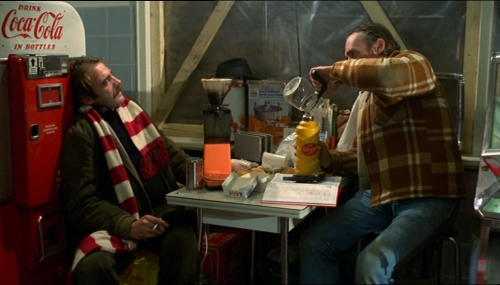The American Friend (1977)
at home, quiet evening, thinking about America

- cowboy - dennis hopper, capitalism ‘all i do is make money’. he travels from city to city in his car (his horse), wields a gun and dabbles in dirty work (selling forgeries to murdering) — he is the embodiment of the corrupting force of America.
- existential dilemma: unknown rumors that his condition is worsening were calculated to manipulate Jonathan, who has a blood disease, into being part of a murder plot to earn an inheritance for his family. His motives are pure and come from an existentially devastating place, but the act is corrupting.
- when he first gets back to his home from France, the voices of his wife and child are jarring and disorienting, bursting from the house. He is alienated from them as he has been corrupted. His family represents what is right and pure in the world and he slowly turns his back on them as he accepts more jobs, getting closer to his American friend.
- Jonathan resists fully becoming a cowboy (symbol of moral corruption here): he stashes away the gun on the train during the second murder, he refuses to use the gun, he steps back from actually murdering - letting Tom do the dirty work, his face is shrouded in shadows and filled with anguish as he holds one of the dying mob members whom Tom has killed. He is always uncomfortable with murder though he cannot say no to it given his condition. The closeness with his American friend or the unflinching acceptance that his American friend is part of the murder plot also signals his morality declining.
- refusing to become a cowboy: he stashes the gun, but also - Tom tries to teach him to drive after the second murder. If he does, symbolically he becomes a “real” cowboy - riding his horse! He is saved by his wife’s sudden reappearance — a reminder of the purity and righteousness in the world and a chance for repentance. He takes it, lets her take the wheel of their red beetle. She strokes his head, consoling him, as she follows Tom.
- note that on the way back he chose to be the driver, and makes the conscious choice of leaving Tom behind.
- ending scene: as he drives away from Tom, he is visibly relieved, laughing (albeit slightly manically) and tells his wife he’s explain this to his son. He soon says the world is going dark — it is too late for him and his journey back home is jeopardized - the car spins out of control. He has lost control himself. Jonathan has already been corrupted despite his final choice of leaving that path (in which Tom represents). Even as he drives away he looks back at the rear window - there seems to be an ambivalence: fearing that Tom is following but also almost as if he expects (HOPES) Tom to be following him.
- the ending scene: Jonathan sees Tom celebrating the blowing up of the van with the murdered mob in it. he realises completely that this is not the path he wants to go down and drives off without Tom. But it is too late for Jonathan - he is already corrupted the moment he steps into France (when he chases down his first victim, he injures his head — his moral integrity is corrupted and broken from then).
- foreshadowing - when Jonathan lands in the airport in France he sees the person in front of him collapse at the end of the escalator — foreshadows how he shoots his first victim down on the escalator. The audience knows what’s coming as soon as he is on the escalator with his victim.
this Current review is it. especially last two paragraphs.